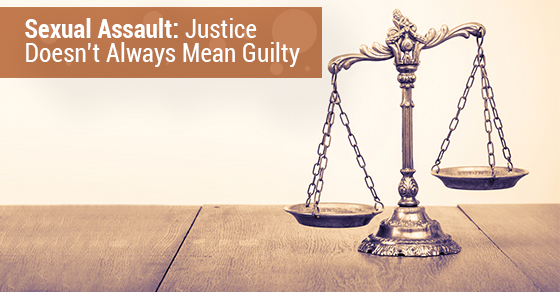Sexual Assault: Justice Doesn’t Always Mean Guilty

Words matter.
Newsflash to the media, politicians and activists: an acquittal is not a failure of justice. Canada’s justice system has checks and balances that do work, considering how overburdened it is, the high the expectations of the public, and how nuanced and complex are the decisions that must be made.
But sometimes, like any other system designed by human beings, the justice system gets it wrong. Sometimes the guilty go free. And sometimes the innocent are convicted. But in the calculus of freedom and human rights at the heart of our democracy, it is worse to see an innocent man convicted than a guilty man go free. Upset that balance, and you end up with a totalitarian state where the rules are meaningless, facts are made up as you go along, and the outcome is dictated by politicians and not by the truth.
It is disturbing to see that even seasoned journalists make the mistake of assuming that a person on trial is guilty, even before the verdict is delivered. That is particularly the case where the crimes alleged are ones which are either high profile, or which are considered to be particularly abhorrent, such as sexual assault.
The Jian Ghomeshi case was a master class in criminal justice, but some people took home the wrong lesson. Mr. Ghomeshi admittedly engaged in bad behaviour; but that behaviour could not be labelled criminal unless and until it was determined to be so by a court of law (not the court of public opinion). The judge had to carefully consider the evidence, and apply legal rules developed slowly and carefully over centuries, before deciding whether the guilt of Mr. Ghomeshi, which many people had already privately and publicly presumed, was in fact proven or not.
Do we want a system of justice where guilt is easy to prove? Where evidence doesn’t matter, and facts are decided by politicians or police officers rather than by trained and impartial judges? There are countries like that on earth, and Canada mercifully and generously grants shelter and protection to thousands of victims fleeing those countries every year.
Sexual assault is bad. A man (and it’s usually a man) who violates the bodily integrity of a woman (and it’s usually a woman but certainly not always) strikes at the heart of her very identity, and damages her just as surely as a bullet. Such conduct must be severely punished.
But is because such conduct is so serious, and deserving of such severe punishment, that its application must be limited to those who deserve the punishment. Before the state takes away a man’s freedom, employment and reputation; before the state condemns him to a life of odd jobs after he serves his jail sentence, because he is now a registered sex offender; society (and our laws) demand that his guilt be conclusively decided, to a high standard. And unless and until his guilt is decided, he is an innocent human being like everyone else.
Alexander Wagar, whose name has been lost under the mountain of publicity his judge received for botching his trial, faced such a trial, and was found to Not Guilty. Twice. The first time, the verdict was unreliable because Justice Robin Camp used illegal and shockingly outdated stereotypes to decide the case. The second time around, the associate Chief Justice of the court found, using the proper law and reasoning, that the Crown had once again failed to prove the case. Let’s leave aside the observation that a country that is willing to take that amount time and energy and expense to decide how to treat a young homeless man is a wonderfully humane country. Let’s focus on the reaction.
Sexual assault activists, politicians, and even some journalists haven’t been discussing how the system was able to correct itself and get rid of the bad apple (Justice Camp). The suggestion seems to be that the justice system failed because the defendant was found Not Guilty. Even as trusted and reliable a source as the Globe and Mail suggested that “concepts such as a high burden of proof (and) presumption of innocence complicate the pursuit of justice in sexual assault cases.” (click here for article)
Seriously? The presumption of innocence is not a “concept”, it is a fundamental human right enshrined in our Constitution. It is not an “obstacle to justice”; it makes justice possible. It is only when a man is found guilty, after passing the rigorous legal test, that he has his life and liberty stripped from him. And that standard doesn’t just protect him, it protects every single one of us from the whims of bullies and despots, and the mass hysteria of crowds. We only need to look to the struggles across our southern border to know how thin the line is between the rule of law and anarchy, between freedom and tyranny. And when even journalists start to refer to these fundamental rights as “obstacles to justice”, those of us who defend those rights every day, by trying to ensure that even those people charged with the worst crimes get a fair trial before their liberty is taken from them, must stand up and take notice and say something.
Rights matter. And the words used to talk about those rights, the words used by politicians and activists and yes, judges, those words matter too.

